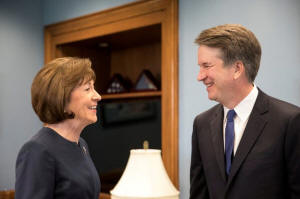|
U.S. senators quibble over Kavanaugh
stance on abortion
 Send a link to a friend
Send a link to a friend
 [August 22, 2018]
By Susan Cornwell [August 22, 2018]
By Susan Cornwell
WASHINGTON (Reuters) - U.S. President
Donald Trump's Supreme Court pick Brett Kavanaugh considers the landmark
Roe v. Wade ruling that legalized abortion to be settled law, Republican
Senator Susan Collins said on Tuesday, but Democrats were deeply
skeptical.
Collins, a Republican who backs abortion rights and is considered a key
vote on Kavanaugh's nomination, spoke to reporters after meeting the
judge in her office.
"We talked about whether he considered Roe to be settled law," she said.
"He said he agreed with what (Supreme Court Chief) Justice (John)
Roberts said at his nomination hearing, in which he said that it was
settled law."
Settled law refers to a legal position that has been consistently upheld
by judges, although it can still be overturned.
Speculation has centered on whether Kavanaugh, a federal appeals court
judge with a solidly conservative judicial record, would vote to
overturn a woman's right to abortion. Senate Democratic Leader Chuck
Schumer, who met Kavanaugh separately later Tuesday, said the judge did
not make it clear whether Roe v. Wade was correctly decided, which
Schumer said was the important question that needed to be answered.

"He would not give me any reassurance that he believed Roe or Casey were
correctly decided or should be left alone," said Schumer, who has vowed
to oppose Kavanaugh. He was referring to the 1973 Roe decision and the
1992 Planned Parenthood v. Casey decision that reaffirmed it.
Trump, who nominated Kavanaugh on July 9, promised during his campaign
to appoint "pro-life justices" who would overturn Roe v. Wade, which
legalized abortion nationwide.
Before Kavanaugh can assume the lifetime job on the nine-member court,
the Republican-controlled Senate must vote to confirm him.
Kavanaugh's judicial record on abortion is thin, although last year he
was on a panel of judges that issued an order preventing a 17-year-old
illegal immigrant detained in Texas by U.S. authorities from immediately
obtaining an abortion.
Collins, a moderate Republican, has said that she could not support a
nominee who had demonstrated "hostility" to Roe V. Wade. She said
Tuesday she would not make a final decision until after Kavanaugh's
confirmation hearings, which start on Sept. 4.
[to top of second column]
|

U.S. Supreme Court nominee Brett Kavanaugh meets with U.S. Senator
Susan Collins on capitol hill in Washington, U.S., August 21, 2018.
REUTERS/Alex Wroblewski

Collins said her conversation with Kavanaugh, which lasted over two
hours, covered a wide range of issues, including abortion and guns
and Kavanaugh's "judicial philosophy." She called the meeting
helpful, productive and informative.
But Schumer was critical, saying Kavanaugh "refused to answer even
the most basic questions about his jurisprudence and his judicial
philosophy" in a 90-minute meeting.
He said Kavanaugh "either wouldn't answer or couldn't' remember key
moments of his tenure" when he worked in White House of former
President George W. Bush.
Kavanaugh also would not say whether he thought the healthcare law
passed under former President Barack Obama, the Affordable Care Act,
was constitutional, Schumer told reporters. Kavanaugh also met
several other Senate Democrats on Tuesday.
Kavanaugh's confirmation will require a simple majority in the
100-seat Senate, where Republicans hold a 51-49 edge over Democrats
and independents.
(Reporting by Susan Cornwell; editing by Susan Thomas, Cynthia
Osterman and Richard Chang)
[© 2018 Thomson Reuters. All rights
reserved.]
Copyright 2018 Reuters. All rights reserved. This material may not be published,
broadcast, rewritten or redistributed.
Thompson Reuters is solely responsible for this content.
 |